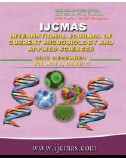


 National Academy of Agricultural Sciences (NAAS)
National Academy of Agricultural Sciences (NAAS)

|
PRINT ISSN : 2319-7692
Online ISSN : 2319-7706 Issues : 12 per year Publisher : Excellent Publishers Email : editorijcmas@gmail.com / submit@ijcmas.com Editor-in-chief: Dr.M.Prakash Index Copernicus ICV 2018: 95.39 NAAS RATING 2020: 5.38 |
According to the census of India 2011, there has been substantial increase in the literacy rate from 64.83 per cent in 2001 to 74.04 per cent in 2011. The present literacy level in Karnataka, which stands at 75.36 per cent, it implies three-fourth of the population can make use of the printed media. Even there is substantial increase in the literacy level among rural mass. Hence, to know the reading and understandability of agricultural information through different farm publications the present study attempts to examine the personal and socio-economic characteristics of different farm publications reader farmers and their association with reading habit. The study was conducted in Dakshina Kannada and Dharwad districts of Karnataka State. In these districts, the three farm publications viz., newspapers, farm magazines and leaflet/folders were selected to analyze reading analysis of the reader farmers. Primary data for the study was collected through a sample of 120 reader farmers in 8 villages in the study area. Simple random sampling procedure was used in collecting the data. The findings of the study revealed that, majority of the respondents 65.00 per cent were having 10-20 years of farming Experience. Whereas, 20.00 per cent of the farmers belonging to more than 20 years of Farming experience. Study also revealed that 35.00 per cent of the respondents were educated up to middle school. Association of profile characteristics of reader farmers with reading habit indicated that out of 11 independent variables such as farmers age, education, land holding, farming experience, annual income, cosmopoliteness, extension agency contact and extension participation exhibited significant relationship with their dependent variable reading habit and innovative proneness, mass media participation and political participation had exhibited non significant relationship with reading habits of the respondents towards farm publications.
 |
 |
 |
 |
 |